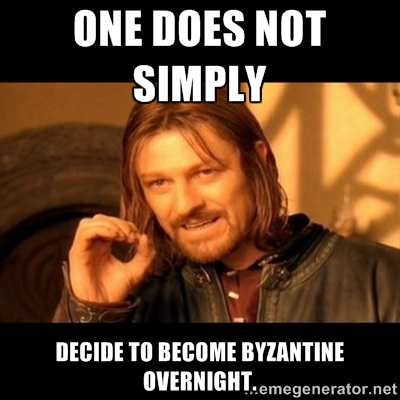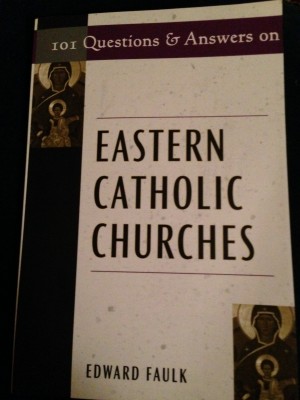Maybe it started because a friend invited you to Divine Liturgy. Or some married priest on Catholic radio caught your attention because, hey, you thought priests had to be celibate. Maybe you’re a fan of that amazing, talented, brilliant and humble Byzantine columnist on Catholicmom.com and figure you need to do whatever she’s doing. However it happened, you suddenly find yourself a Roman Catholic considering whether or not you should “become Byzantine.”
I completely understand, because I was once in your shoes. I know that making this discernment can be tough and feel like truly uncharted territory by comparison to the other big decisions you might make in your life. While I’m not a card-carrying spiritual director or expert on this topic, I have at least made the journey from West to East and learned a few things about the route.
I’ve compiled these things in two parts with the hope that it will help you better navigate your own discernment. This first part will deal with some recommendations for discerning, and part two will look at some common misconceptions of the Byzantine churches that aren't often discussed.
Much of this information could probably apply to discerning a switch to any of the Eastern churches, but, being Byzantine, I don't feel as qualified to speak on the other Eastern churches.
So without further ado, here is my non-exhaustive, non-expert, strictly experience-based list of recommendations for discerning a commitment to practicing Byzantine spirituality:
1) The first thing to realize is that:

Once you have prayerfully decided that God is calling you to explore this option in your life, find your local Byzantine church. There may be a few of different ethnicities from which to choose (Ruthenian, Melkite etc.), so maybe take the time to visit each of them a few times and see what gives a good impression.
Then stay there and practice in that church for a year, and don’t make any decisions until that year is over.
And yes, I did say at least a year.
Here’s the thing: Byzantine spirituality is not simply cosmetically different from Roman spirituality, as many people tend to assume. It involves a vastly different approach to the theology you have always known as a Roman, meaning you will actually have to learn a new understanding of some seemingly basic concepts like original sin, the makeup of the human person, and the afterlife. It also involves a vastly different approach to developing a relationship with the Lord, and it takes consistent, long-term practice as well as experience of the entire liturgical year to know this spirituality well enough--especially coming out of Roman Catholicism--to make a sound decision about how God is calling your heart.
What do I mean by practice? I think that looks different for every person, but I would say it involves at the very least attending Divine Liturgy (our version of the Mass) every Sunday, which will fulfill your Sunday obligation. I would also say it means committing to attending one pre-sanctified Divine Liturgy (see #2) a week during Lent. Any other liturgies or religious ed classes that your church offers could only help.
2) Buy and read this book:
It’s 101 Questions and Answers on Eastern Catholic Churches by Deacon Edward Faulk, and it is PHENOMENAL for explaining some basic information on the Eastern churches to a Roman audience.
The questions in the book are divided into various topics (an introduction, the churches, history, workings, theology, and an epilogue), and they are answered with intelligent and comprehensible language. You don’t need a PhD to understand this, nor will you feel like the author is talking to a five year old.
This book can help you learn about what the heck that pre-sanctified Divine Liturgy thing is that I mentioned in the first point, some of the differences in theological approaches, and much more.
I should confess that I just found this book, like, two months ago, aka over four years after beginning my switch to Byzantium. It would have saved me loads of trouble to have had this back then instead of learning much of it’s contents through other, somewhat-more-exhausting means (like asking my husband. As if he needed the ego boost…)
3) Speaking of ego-boosting, you can also learn more by reading some of my articles here at Catholicmom.com.
Because they're amazing. I'm just kidding, but at the very least, they might help you glean little bit more information about the East. I also try to include at least one resource in each article from someone wiser than myself, and these resources might be helpful as well.
4) Do everything else that you’ve ever learned about discernment:
pray, fast, attend the sacraments regularly, practice self-knowledge, see what’s bearing fruit in your life, etc.
Then make a decision. The problem with sitting on the fence waiting for a clear answer is that nothing was ever obvious to anyone sitting on the fence other than a few awkward splinters. If you make a decision, it will either be clear that it was the right or the wrong one, and this is one case where you can very easily back out of a wrong decision.
In the course of all of this, you might be tempted toward some common misconceptions about the Byzantine churches that, in my experience, can really cloud a person’s judgment. I’ll be writing about those in part two, coming in two weeks, so get excited.
Do you have any questions about all of this so far? Please feel free to ask and discuss any questions in the comment section!
Copyright 2014, Brittany Balke
About the Author

Guest
We welcome guest contributors who graciously volunteer their writing for our readers. Please support our guest writers by visiting their sites, purchasing their work, and leaving comments to thank them for sharing their gifts here on CatholicMom.com. To inquire about serving as a guest contributor, contact editor@CatholicMom.com.



.png?width=1806&height=731&name=CatholicMom_hcfm_logo1_pos_871c_2728c%20(002).png)
Comments